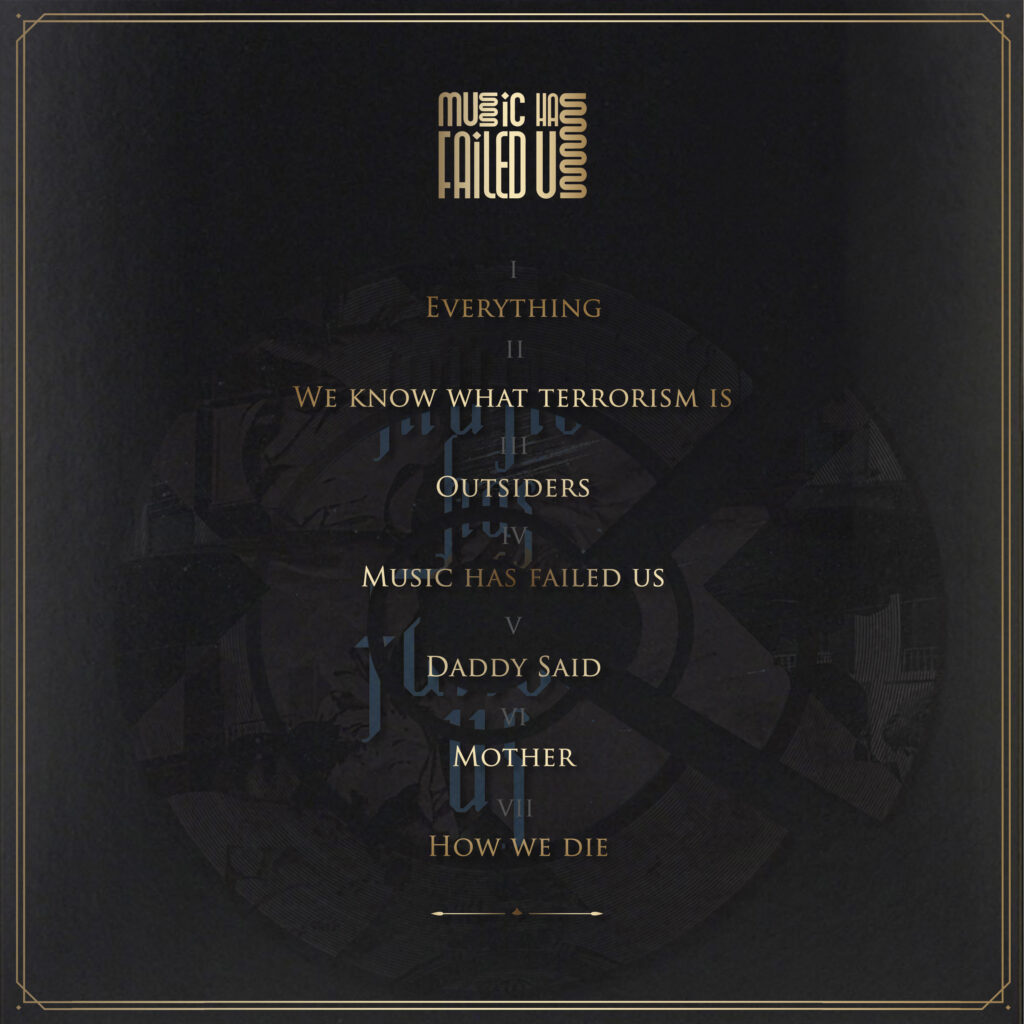Throughout Music Has Failed Us, IB uses terms like a religious devotee. Evoking imageries of temples and prayers, the artiste approaches like an inquisitor, as if to probe the order of things. IB’s messages are evangelical, so much so that the album becomes something of a crusade…
By Sybil Fekurumoh
Nigerian poet, Abu Ibrahim, is a self-taught performing artiste. Abu Ibrahim, popularly known as IB, started performance poetry as an undergraduate at the University of Benin, Nigeria. The stage has been a place to call home, with IB carrying on spoken word poetry as a conscious art form for change. It is this consciousness and urgency that IB brings to Music Has Failed Us. IB was part of a select group of poets from around the world who campaigned for spoken word poetry to be made a distinct category at the Grammys. This was successfully achieved in 2022 with the introduction of the Best Spoken Word Poetry Album, alongside other categories, and with Music Has Failed Us accepted for consideration for the Grammy award.

In the past decade, Nigeria has endured internal conflicts that bear a striking resemblance to those of previous times; yet, with its peculiarities. Nigeria’s woes are aplenty, exacerbated by corruption, and poor governance, and characterised by the presence of terrorism, banditry, and instances of police brutality, with the 2020 EndSars protest standing out as a defining moment of the era. This constant dissension has birthed creatives who use different media for advocacy. In the midst of this troubled backdrop, IB’s expressive seven-track spoken word album emerges as both a sermon and a protest that he delivers with much aplomb. Released in 2021, IB’s spoken word album decries the human condition and sheds light on humanity’s shortcomings.
The artiste constantly declares his otherworldliness in Music Has Failed Us. The album opens with “Everything,” where IB strips off earthly, ephemeral holdings, and his words become his only possessions. In “Outsiders,” the poet is an ethereal protesting tribesman who solicits for his nation, and in the titular “Music Has Failed Us,” the poet mourns the gradual demise of a cherished art form: the protest song. Throughout Music Has Failed Us, IB uses terms like a religious devotee. Evoking imageries of temples and prayers, the artiste approaches like an inquisitor, as if to probe the order of things. IB’s messages are evangelical, so much so that the album becomes something of a crusade. He is certain of the permanence of his messages, words that last forever, that “outlive breath,” and “stretch between words.” The writer’s words are as “things engraved in eternity…”
(Read also: Rummaging for Omens: A Review of Nneoma Otuegbe’s Book of Poetry)
“We Know What Terrorism Is,” is an expression of grief from the effect of terrorism and the subsequent despair that ensues. With each tragedy unfolding, the poet bemoans, “Hopelessness is a pond we drink from.” Amidst the aftermath that engulfs the afflicted victims, the poet keenly observes how Nigeria’s insurgencies swiftly fade from public consciousness, fleeting as the very moment they are reported. The audience encounters a poet burdened by weariness, dreading the imminent onslaught of the next attack, as the cacophony of gunshots accompanies the stream of news of banditry and Boko Haram attacks. These incidents, scarcely acknowledged and rarely commemorated, leave a haunting void, “like we were born never to live or be remembered,” as if the lives impacted were destined to exist in perpetual obscurity.
“How We Die,” the last track of the album, shares in this grief, but in this case, to decry police brutality. The artiste mentions an alarming truth: how young Nigerians are constantly profiled by the police. His words echoes the voices of young Nigerians in a constant state of panic, “We are dying similar deaths out here.” The track concludes with a tribute, honouring the memories of those lost due to the callousness of law enforcement.
(Read also: How Social Media in Africa is Helping the Fight Against Dictatorships)
Music Has Failed Us is an album about social change. It is ambitious, too. But perhaps the album’s intentionality overshadows its thematic cohesion, especially with the inclusion of the titular track, “Music Has Failed Us.” The poem takes a swipe at the hedonistic display that is prevalent in popular music, as Nigerian music becomes a global export. Recently, Afrobeats have gained international appeal, with Nigerian artistes becoming mainstream stars. Artistes such as Wizkid and Tems are continually receiving accolades, and Burna Boy is selling out shows internationally. While the eponymous track offers a relentless critique, it risks being too inflexible in its judgment, that it appears narrow-minded at times. While it’s important to recognise that conflict exists, there should not be an exclusion of the expression of joy and pleasure. One does not have to be in constant conflict to find inspiration for artistic expression. That said, calling out self-indulgence can itself be a form of protest against the prevalent issues of drug abuse, fraud, and sexual exploitation in Nigeria.

Still, in the poet’s doggedness, “Daddy Said” is pliant. The poet witnesses a father’s transformation, and there is comfort in a father shedding off stoicism for affection. The poem becomes the change to see; his father, a personification of the descent from tyranny to tenderness. IB is gracious with his words with “Mother.” “Mother” is a celebration of motherhood. The poem draws parallels between a mother and a nurturing country. The mother’s homeliness is in contrast to Nigeria’s hostility to its people. “Mother” embodies the duality of “sacrifice and the altar,” personalising selflessness. However, while “Mother” exemplifies IB’s reverence for the maternal figure, the artiste’s treatment of women’s bodies throughout the album leaves little to be desired. Their bodies are rightfully recognised as vessels for life, but at times, the portrayal edges uncomfortably close to objectification. Sensuality and reproductive capabilities are emphasised to an extent that may overshadow the spectrum of a woman’s identity.
With poetry, participation is part of the experience. Listeners employ their sensibilities and use discernment to make out a poet’s message and/or state of mind. But with spoken word, an artiste must carry along the audience, setting the scene so that when the punch lines drop, they reach the core of the audience. Abu understands this dynamic. His free verses become an open field to have a conversation. His free verses are an open field where he invites the audience to see from his perceptive, and reflect on subtle subjects of debauchery, and toxic masculinity. The weighty topics, such as insecurity and censorship are conveyed with similes and metaphors and carried along by the rhymes and rhythms of his delivery.
But the lingering question is whether Music Has Failed Us truly lives up to its potential as a powerful protest song. Despite its assertiveness, there remains a subtle undercurrent of hesitance in the poet’s words. Still, the audience will undoubtedly grasp the intended message, their fingers snapping in agreement, and the oohs and aahs will stream at his word construction. While the thematic consistency may waver, the album’s critique of societal vices remains a potent form of artistic resistance.
(Listen to Music Has Failed Us here.)
Sybil Fekurumoh is a senior writer for Afrocritik. Connect with her on Twitter and Instagram at @toqueensaber.



